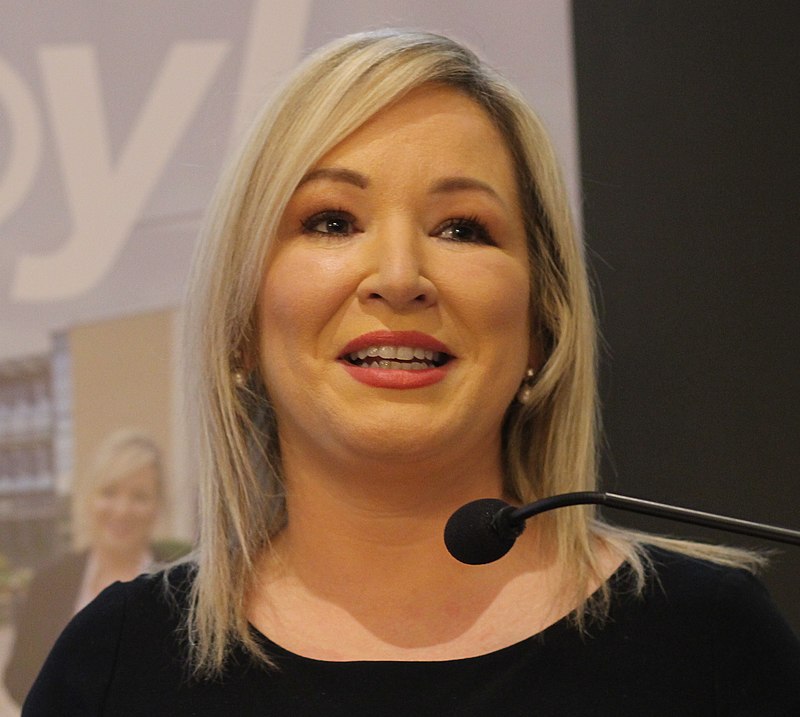After having been suspended for around two years, Stormont was reopened at the beginning of the month, and Northern Ireland’s first Nationalist and Republican First Minister, Michelle O’Neill, was sworn into office. This comes in the wake of the historic 2022 Northern Irish Assembly elections, where Sinn Fein, for the first time, won the popular vote. This has been a psychological blow to the Unionist movement, and many Nationalists see this as a new dawn in Northern Irish politics. However, although this has a possibility to cause drastic changes to the political landscape north of the border, it might not be in the way that those focused on the sectarian divide might expect.
O’Neill has similarities to past leaders of Sinn Féin in Northern Ireland. Having grown up during the Troubles and coming from a Republican background, many of her family members were members of the IRA. One of her cousins who was in the IRA was killed in an SAS ambush, while another one of her cousins was injured, also while serving in the IRA. Her father, through whom she would eventually become involved in politics, was imprisoned while serving in the IRA. With such connections, it’s unsurprising that she herself has attended memorials for many IRA members. In this sense, she has close connections to the IRA in the same way that former leaders like Martin McGuinness and Gerry Adams would’ve had.
Where O’Neill breaks with this tradition, however, is in how these connections have not been the centrepiece of her public image. Her first experience with Republican politics was working for her father, who had at that point been released from prison and was serving as a councillor. After joining Sinn Féin in 1998, by which time the Good Friday Agreement had been signed and violence had mostly ceased, she worked as a researcher for the MLA France Molloy, until being elected to the Northern Irish Assembly in 2005. This culminated in her appointment as health minister in 2016, during which she repealed the ban on gay and bisexual men donating blood, and her election to the leadership in 2017, where she won out over former IRA member Conor Murphy. This was seen by many as Sinn Fein ending its direct association with the IRA, representing a drastic shift in the political landscape.
Since assuming the leadership, O’Neill has downplayed her party’s Republicanism and violent roots. While campaigning prior to the 2022 Northern Irish Assembly elections, she avoided discussions on Irish unification. She instead focused on “bread and butter issues”, such as supporting people through the cost of living crisis, in addition to voicing support for abortion rights, both issues unionist parties overlooked. Throughout the campaign, she claimed she would act as a “First Minister for All”, and even went so far as to promise to respect the Royal Family. This was a strategic decision since Sinn Féin has yet to win the argument on unification north of the border. A poll done by the Irish Times in November of last year gave the Union with Britain majority support, and a twenty point lead over unification with the Republic. For this reason, a strong case can be made that Sinn Féin won despite their Republican philosophy, rather than because of it.
Sinn Féin’s victory was a psychological blow to unionists since this entitled O’Neill to become Northern Ireland’s first Republican First Minister. As a result, the DUP boycotted Stormont, allowing Sinn Fein to present them as an obstacle to the effective governance of Northern Ireland. Another strategic decision made by Sinn Fein, this reduced the DUP’s popularity, and eventually led to them being pressured to end their boycott, allowing O’Neill to formally become First Minister at the beginning of the month. In her first speech in the role, she reiterated her promise to be a “First Minister for All”. In this speech, she pledged “cooperation… with those of a British, a Unionist tradition…”, and in conversation with Sky News’ David Blevins refused to rule out attending unionist events such as Orange Marches. She used her first speech to primarily discuss greater investment in public services and an end to public sector strikes, both of which with the aim of supporting people through the cost of living crisis.
In the aftermath of this series of events, there is a possibility that senior Unionists have recognised their error and are attempting to change course. Although her own family has connections to loyalist paramilitaries, the DUP’s new Deputy First Minister, Emma Little-Pengelly, has likely seen the value in working with O’Neill on these terms. This sentiment is displayed in her first speech in her new position, when she acknowledges that “Michelle is an Irish Republican, and I’m a very proud Unionist. We will never agree on those issues. But what we can agree on is that cancer doesn’t discriminate, and our hospitals need to be fixed”.
The fact that Northern Irish politics has reached such a stage grants us a glimmer of hope. Although both major party leaders come from sectarian backgrounds, First Minister O’Neill has set a new tone. This tone is one which focuses less on sectarian division, and more issues that economically support the people of Northern Ireland. This message is gaining traction, which is why the DUP has been forced to follow suit. Although unification likely remains out of reach in the long term, this may be a sign that sectarianism in Northern Ireland has been sidelined in favour of a more conventional and inclusive politics. Although it’s understandable to have doubts due to the backgrounds of the First Minister and Deputy First Minister, at this point, all we can do is have hope.






